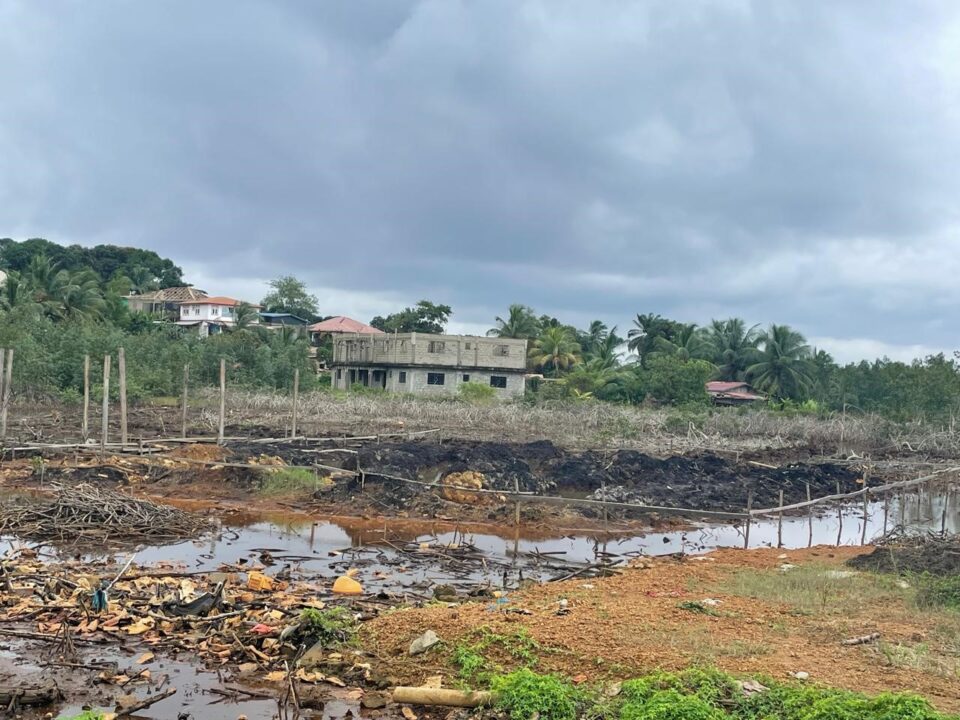Image of wetland being cultivated in Pago’s Island
By Laymah Kollie/Internews Environmental Reporting Fellow
Taking a walk in Pargo’s Island early Wednesday morning after a day-long environmental training at Internews was fun with my colleagues teasing and hyping one another as the moment passes by. It is a rainy day in Monrovia when people would normally prefer to stay at home and enjoy the warmest breeze from the comfort of their bed but for us duties always call. As we walk through the community, we spotted a newly cultivated swamp land right at the backyard of a completed building, in curiosity my teammates and I decided to reach this area to get a full view. While enroute we saw a young lady seated on the porch of the building watching the atmosphere. Her name is Siah Taylor.
“Where are you people going?” she asked. In response a member of my team answered “we are just taking a look around your house”
Eager to understand our mission around her house, Siah decided to join our queue. Getting to the back of the house we saw newly cultivated mangroves in the wetland. Community dwellers have pillars in the swamp for crops plantation. Some are in the process of landfilling the swamp for house construction while others have already commenced theirs. The community seems to be closely eliminating mangroves from its reserve area. Construction of houses have extended to a large portion of the wetland. It is alarming how residents are so focused on building houses in the swamp without realizing any effect it might pose on their lives.
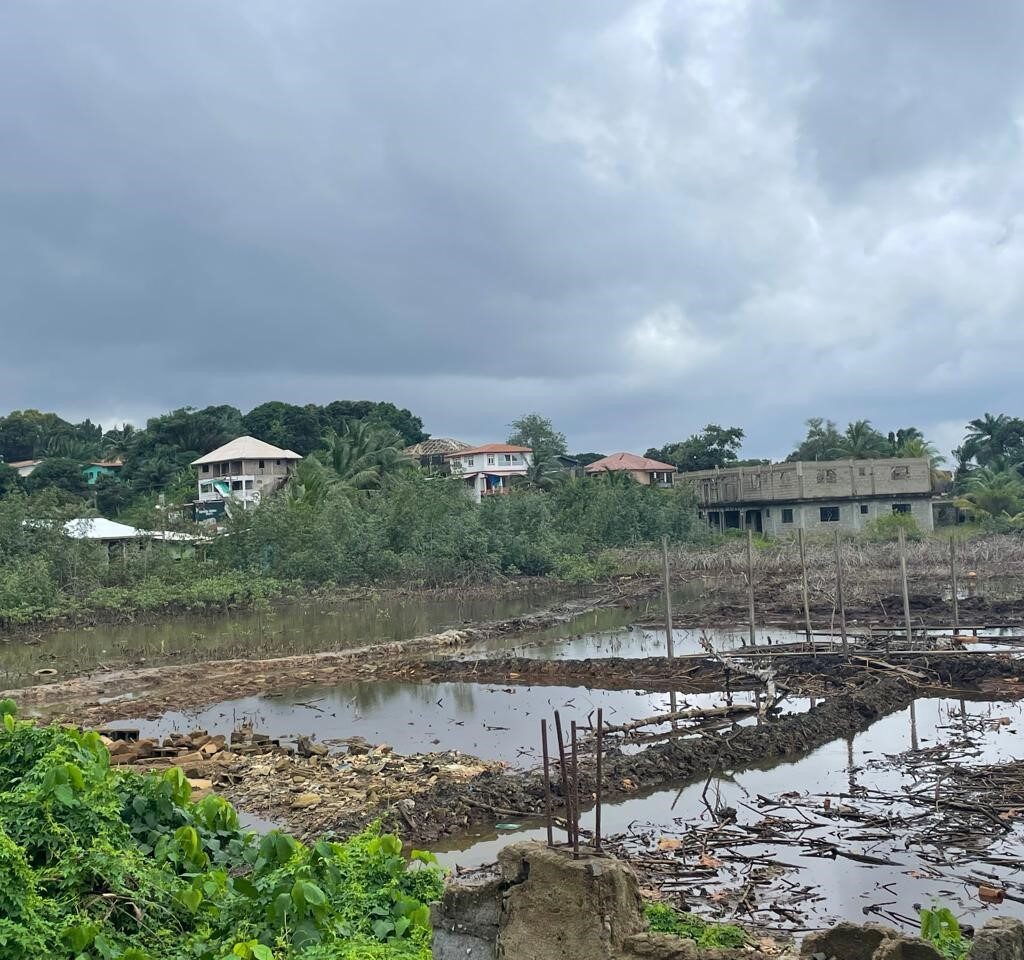
Community dwellers cultivating swampland
For Siah, there’s already a residence in the swampland that is owned by her uncle. The recent cultivation of the site is intended to grow crops until otherwise. “My Uncle built this house here and we are staying here. We are making a garden in the swamp until he decides to build there”.
Also, Mr. Nelson Kamah, who have secured his spot of swampland for residential purpose explained his next plan of action. “I’m filling this place so I can build my house anytime soon,” he said.
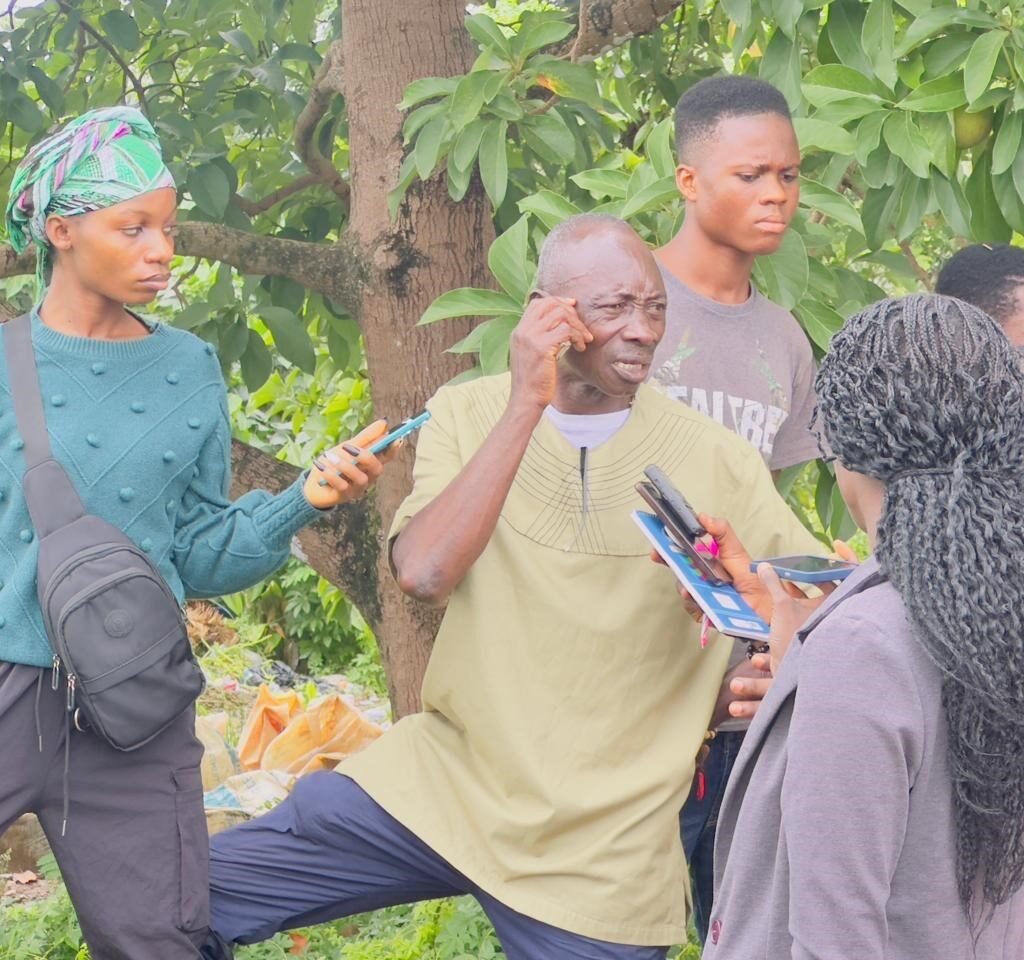
Mr. Nelson Kamah in conversation with reporters in Pargo’s Island
Another resident Grace Foday said “land business hard and we need to build our house. Only the swamp remaining, so we are making use”.
Like Grace, Oldman Stanley and Ma Gloria expressed same concerns. They blame their building in swampland to the unavailability of land in urban areas.
During our interaction, they seem to be inadequately knowledgeable about the importance of mangrove and the reservation of wetland.
Mangroves are extremely important to the coastal ecosystems they inhabit. Physically, they serve as a buffer between marine and terrestrial communities and protect shorelines from damaging winds, waves, and floods. In aspect of Coastal defense, Mangroves are the first line of defense for coastal communities. They stabilize shorelines by slowing erosion and provide natural barriers protecting coastal communities from increased storm surge, flooding, and hurricanes.
As per Global forest Resource assessment, 2020 (FRA 2020), world over, 113 countries have Mangrove forests covering an estimated 14.79 million hectares. The largest Mangrove area is reported in Asia (5.55 million hectares) , followed by Africa (3.24 million hectares),North and central America (2.57 million hectares) and South America (2.13 million hectares). The report states that more than 40 percent of the total area of Mangroves was reported to be in just five countries: Indonesia (19 percent of the total), Brazil (9 percent), Nigeria (7 percent), Mexico (6 percent) and India (3 percent).
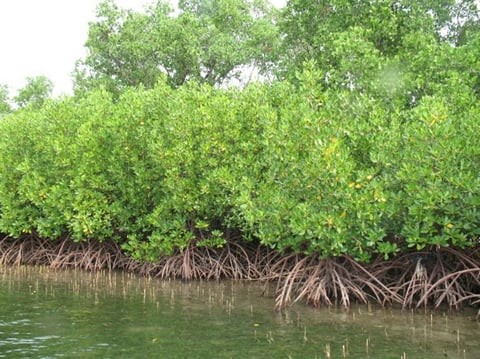
Image of mangrove
According to the Interactive Country Fiches, Liberia has approximately 600,000 hectares of freshwater wetlands that include habitats for many residents and migratory bird species. However, with the level of cultivation being done poses serious threat to citizens. This situation highly contributes to the effect of climate change and related disasters like floods, erosion winds.
Statistics from a World Bank Group 2024 report states that Liberia is poised to experience rise in sea level and coastal inundation that will increasingly threaten the countries’ extensive coastal zones and urban areas with frequent and intense floods and droughts. For communities in Monrovia and surroundings the report has already started taking keen effect.
According to the National Disaster Management Agency (NDMA) of Liberia between March to August 2024 Liberia has approximately recorded over 60,000 victims of flood in several communities in three of the countries’ fifteen counties. The counties are Grand Bassa, Margibi, and Montserrado. The situation has affected over 5,200 households and displaced over 26,000 individuals. The disaster has not only caused physical damage to citizens but also inflicted psychological and emotional constrains to these families.
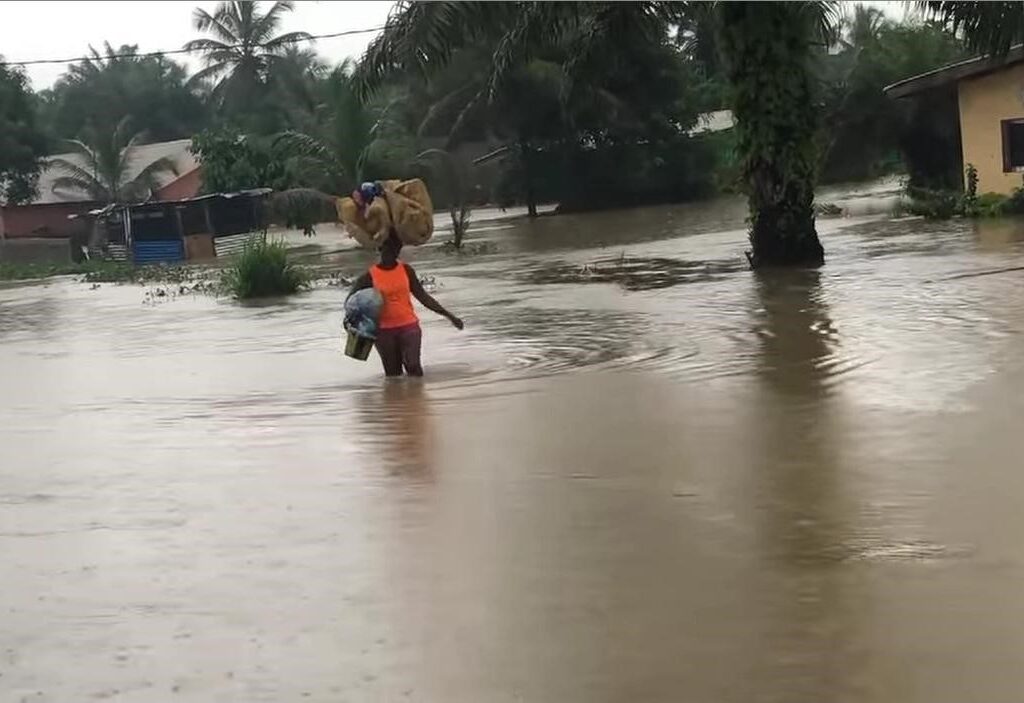
Recent Flood in Liberia
It was a terrifying moment for community like Whein Town that experience the flood disaster in this period. In conversation with some of the victims in Whein Town Community in District#4 Montserrado, they expressed frustration over the issue. According to them the disaster does not only affect their homes but their kids’ education and their jobs too.
“When the water set here we can’t go anywhere. Our children can’t go to school, ourselves can’t go outside, not even to the next yard. We can spend the entire days inside” flood victim Laura Wilson, a mother of six children said.
At the same time, Mr. Ernest Hittins, a resident of Whein Town and father of nine explained his ordeal “the water can enter our houses. The entire road can be river and like that I can’t go to work because my clothes will get wet”
Though national government is escorting efforts to address the rising situation but it seems to be catering to the problem and leaving the root cause. The National Disaster Management Agency has embarked on the distribution of cash to victims of the flood disaster in Montserrado, Bassa and Margibi Counties. The Executive Director of NDMA in a speech at the Ministry of Information, Culture Affairs and Tourism on August 8, 2024 mentioned that the Entity has mobilized USD$1.5Million to be distributed to affected individuals and households in response to the situation. Also, civil society like Red Cross and other humanitarians have applied efforts in restoring hope to the affected communities. Despite all these efforts, the situation continue to get worst by the day. Rainfall in Liberia has increase and is posting serious threat to people living in wetland communities and around coastal areas.
Acknowledging the fact that floods and other disasters happen as a result of climate change but citizens are to blame too. The constituents either by ignorance or disobedience are violating national bylaws and protocols on the reservation of wetland.
Environmental Protection Management Law of Liberia enacted in 2003 puts Wetland, River and Lakes in a conversational category thereby considering them areas of protection. The law mandates that areas such as swamp land are public land and are not to be sold or wrongfully temper with.
Part VI of the Environmental Protection and Management Law of Liberia chapter on Guidelines and Standards for the Management of the Environment and Natural Resources section 75 talks about Protection of Rivers, Lakes and Wetlands.
Section 75 states that no person shall in relation to a river, lake, or wetland carry out any of the following activities:
- Use, erect, construct, place, alter, extend, remove or demolish any structure in, on, under, or over the bed; b) Excavate, drill, tunnel or disturb the bed otherwise; c) Introduce or plant any part of a plant, plant specimen or organism whether alien or indigenous, dead or alive in a river, lake or wetland; d) Introduce any animal or micro-organism whether alien or indigenous, dead or alive in a river, lake or wetland; e) Deposit any substance in a river, lake, or wetland or in or under its bed, which is likely to have adverse environmental effects on the river, lake or wetland; f) Direct or block a river, lake or wetland from its natural and normal course; and g) Drain any river, lake or wetland.
At the same time, Liberia is a party to the Ramsar Convention on Wetlands of 1971. This convention is an intergovernmental treaty that provides the framework for the conservation and wise use of wetlands and their resources.
Regardless of regulation, community dwellers especially in Montserrado have widely built houses in swamps, cultivating mangrove and landfilling wetlands. Environments like Doe Community, Whein Town, and Pago’s Island that were once considered natural treasures have turned out to be overcrowded. Through the cultivation, wetlands have become dry places. There is limited swamp land with mangrove to absorb the inflow of water that comes from heavy rainfall. Also, people have built houses in the water ways, causing erosion and blocking smooth passage of erosion. Because of this constrain, rainfall tends to cause floods to houses in wetland and surroundings.
Image of houses built in swamp in Whein Town Community
Nevertheless, Expert thinks citizens are not duly inform about causes of the problems, neither are they aware of their contributions toward the harm affecting the community. Atty. Urias Pour, Human Rights Commissioner said government needs to make more awareness about the protected areas. He believes when people are educated about the effects of cultivating mangrove, they will desist from the act.
“The people are not aware about the regulations on protected areas. Most times government makes law without taking time to explain it to the people. Let government do more awareness on the law. Education will help to decrease the cultivation of swamp land”
Regrettably, the fight to resolve these issues may take a long time for Liberia to get adequate results as regulatory bodies are allegedly violating the law too. Investigation into the usage of wetland in Pago’s Island reveal that former Land Commissioner Suku Mensah during his tenure allegedly sold swamp land to community dwellers. The former Land Commissioner who is also believed of having properties (houses) built in the swamp is accused of selling other portions to other residents.
Oldman Nelson who has allegedly purchased one lot of land from their Commissioner was heard narrating plans on how he intends to cultivate the site.
“I bought this land from the commissioner by then. Right now, I’m trying to fill it and build something on it in the future” Oldman Nelson Kamah said.
Another resident Siah Taylor said “My uncle bought this place from the Commissioner. I’m staying here because he’s not around”.
Although, it is not certain as to whether the Liberia Land Authority has in placed prescribed consequences for land law violators but the Environmental Protection Agency through the Environmental Protection Management Law Section 75:6 prescribed a fined of USD$5,000 or imprisonment for period not exceeding two years for violators of protected areas.
“Any person who contravenes the provisions of subsection (1) commits an offence and is on conviction liable to a fine not exceeding 5,000 US DOLLARS or to imprisonment for a period not exceeding two years or to both”
In offering due accordance, the accused Commissioner Suku Mensah was contacted by this Reporter via WhatsApp message, offline calls and text messages but he didn’t respond to the allegation up till the time of this publication.

